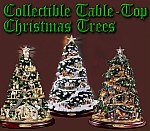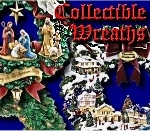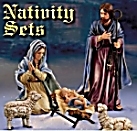| Written by Paul D. Race for Family Christmas OnlineTM |
- "Civil Christmas" - A civil holiday in which many people get a day or more off of work or school.
- "Economic Christmas" - A five-to-six-week period in which businesses and movie studios exploit the secular icons of the season (Santa hats, elves, Christmas lights, etc.) to sell their products.
- "Cultural Christmas" - A time when many people try to reconnect with their families and with the happiest memories of their past, perhaps trying to rekindle a personal sense of hope before the long dark nights of winter.
- "Biblical Christmas" - A time when Christians celebrate the grace God gave us by sending His Son to seek and to save that which was lost.
A Brief History of ChristmasThis article is not about the actual birth of Jesus, the founder of Christianity, but about the midwinter celebrations of His birth, which have waxed and waned over the centuries since. Today, Christmas celebrations are so much a part of western culture, and even our economy, that it may be hard to believe that Christmas wasn't always celebrated by Christians, or that much of the folklore surrounding the holiday is less than two centuries old.Christmas in the "Dark Ages"Historically, we know that the early Christians did not celebrate the birthday of Christ, or even pretend they knew what day He was born. We also know that many ancient European religions some sort of midwinter feast. Often the feast was celebrated around the winter solstice, or as close as they could get to it with ancient calendars. As the shortest day of the year, the solstice was a sort of milepost - a sign that things were bound to get warmer and brighter eventually. To celebrate the coming "rebirth" of nature, some folks set out extra lamps or brought evergreen plants like holly and mistletoe indoors to give a "spring-like" atmosphere to their homes. During the fourth century A.D., European Christian leaders began allowing, and eventually encouraging their followers to celebrate the birth of Jesus on or near the solstice. In some cases, this seemed to be recognition of a grassroots"-level practice that had already slowly spread around the Mediterranean. The "Christian" midwinter celebration would commemorate the coming of Christ during the (spiritually) darkest ages of mankind. Christmas was added to the "church calendar," and eventually became the second most important Christian Holy Day (after Easter). Christmas in EnglandDuring the English Reformation, the Puritans outlawed Christmas celebrations, since they were largely a Roman Catholic tradition, and, sadly, some practices had become anything but spiritual. After the monarchy was restored, Christmas crept back into English culture. But by then religious devotion was becoming the exception rather than the rule in England, and Christmas became less a religious celebration than a reason to have parties at the end of the year. Fortunately, the English Christmas received some redirection in 1843, when Charles Dickens wrote A Christmas Carol. Dickens' work was so popular that it restored national focus and enthusiasm for the holiday. (To many modern Americans, Christmas isn't complete without some homage to Dickens-era culture and even English winters). Christmas in the Rest of EuropeMeanwhile, in European countries that avoided Christmas in North AmericaIn what eventually became the United States of America, traditions from England, Germany, and other countries crossed cultural barriers to find their way into most American homes eventually. Still, the importance of Christmas waxed and waned over the centuries, often mirroring English trends. By the early 19th century, raucous secular celebrations became so dominant that Christmas was no longer quite a "family holiday," much less a religious celebration. Then, in Admittedly, some people believe that adding Santa to the mix has diluted the message of Christmas. But it's worth remembering that in North America, Christmas was largely secularized before Santa achieved prominence, and the rise of Santa at least helped to make Christmas a family holiday again. Risks of "Over-Celebration"?By 1870, both A Christmas Carol and "A Visit From St. Nicholas" had crossed the Atlantic to work their magic on other continents. Christmas became more and more of a family holiday, which was good. But, as gift-giving among family members increased, "Christmas shopping" began to seriously affect the economies of both the United States and England. Christmas itself became a sort of industry, as decorations, Christmas books, and so on, grew in popularity. But a far greater force was Christmas' growing effect on the retail industry in general. By the late 20th century, most retailers depended on the five or so weeks between Thanksgiving and Christmas for the bulk of their income. Of course, economic and cultural forces are helping to steer Christmas in directions its early European Christian celebrants never expected. And it is, quite frankly, to the benefit of most businesses to stress the secular aspects of the holiday (and non-religious icons and spokespersons like Santa and Rudolph). This way even people who hate Christianity can overspend in good conscience. This adds to the level of confusion and pressure in many people's homes as well, as families strive to balance the sacred with the secular, and the family holy day with community or church projects. Oddly, many people who appreciate Christmas the most are the ones who enjoy their own Christmas celebrations the least, because by the time the "big day" comes, they've been run ragged by other people's projects and expectations. Christmas TodayNorth American and much of Western European culture today celebrates at least four Christmases.
Almost nobody celebrates only one aspect of the holiday; as an example, the cynical and the religious meet in line every December, in hope of meeting someone else's expectation for the season. Simultaneously, both are also helping some retailer meet his or her bottom line. And everyone who celebrates any kind of Christmas is equally vulnerable to disappointment or to joy as things go wrong - or right - that we didn't expect. If this really is a season of grace, as Christians believe, then I pray we can all experience the grace and exercise the graciousness necessary to overcome any disappointments or conflicts with anyone who sees Christmas differently than we do. In the meantime, we wish you the very best that Christmas has to offer, Paul and Shelia Race If you've been reading our pages, you know that we have big plans and a lot on our plate, so keep checking back. And contact us with any questions or suggestions you have in the meantime. Paul Race To return to the Christmas Musings page, click here. To return to the Family Christmas OnlineTM Home Page, click here.
| 
|
Note: Family Christmas OnlineTM is a trademark of Breakthrough Communications(tm) (www.btcomm.com).
All information, data, text, and illustrations on this web site are
Copyright (c) 2006, 2007, 2008 by Paul D. Race.
Reuse or republication without prior written permission is specifically
forbidden.
Family Christmas Online(tm) is a participant in the Amazon Services LLC Associates Program, an affiliate advertising program designed to provide a means for sites to earn advertising fees by advertising and linking to amazon.com.
For more information, please contact us
decorations that have been popular with our readers.

| 
| 
| 
| 
|




